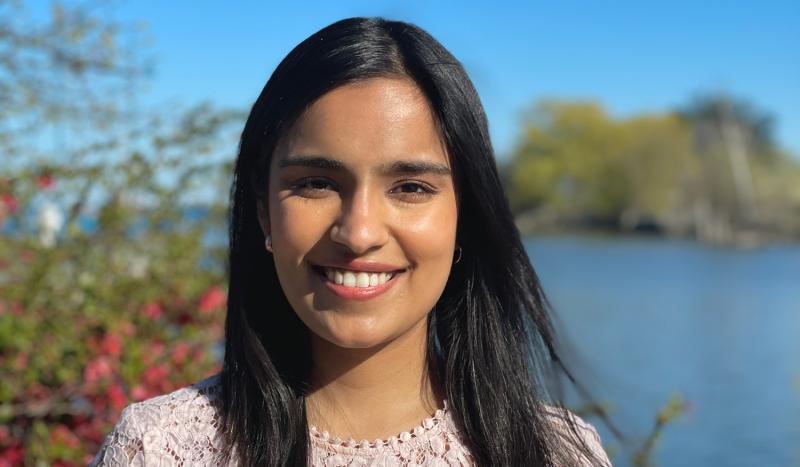May 19, 2021 | Volunteer & Awards
Mishika Mehrotra awarded a Gates Cambridge Scholarship
By Kristy Strauss

UTM psychology graduate Mishika Mehrotra (BSc 2019 UTM) has been awarded a full scholarship to the University of Cambridge to continue studying child development. Photo courtesy of Mishika Mehrotra
Mishika Mehrotra (BSc 2019 UTM) was on her way home from work when she got the email. She had just received a scholarship that would change her academic life.
Mehrotra, a U of T Mississauga psychology graduate, learned she had been awarded a Gates Cambridge scholarship to pursue a PhD in psychology at the University of Cambridge.
“I'm still letting it sink in. It's incredible,” she says. “I really didn't think I was going to get it. But it’s been amazing.”
The award is a full-cost scholarship from a trust established by the Bill and Melinda Gates Foundation to recognize academic excellence, a commitment to improving the lives of others, and a capacity for leadership.
how do parent–child conversations at mealtimes influence a key social and success skill for children?
At the University of Cambridge, Mehrotra will examine how parent–child conversations at mealtimes influence children’s self-regulation.
“Mealtimes are interesting because children learn a lot of regulatory behaviours by observation during mealtimes, for example, waiting your turn,” she says, adding that self-regulation is important because it can impact a child’s success in school, their social competence, and their health – which ultimately impacts their future.
When a child can learn to self-regulate early, it can lead to their short-term success and long-term well-being.
“Family factors and environmental influences play a huge role in shaping children's regulatory capacities,” she says.
A thesis exploring how caregivers can influence tendencies to sympathy
Mehrotra first became interested in psychology when she took a class in high school. That passion led her to UTM, where she studied psychology.
While completing her studies at UTM, she had a chance to work as a research assistant in psychology professor Tina Malti’s lab. Here, she developed an interest specifically in children’s social and cognitive development.
At the lab, Mehrotra studied why some children feel guilty after violating social norms while others feel happy.
“For my thesis, I examined how children's sympathy and attention to environmental cues related to these emotions and found that children with lower sympathetic tendencies reported guilt for transgressing if they paid more attention to the victim relative to a self-serving cue,” she explains. “These findings were important because they implied that even children who are not very sympathetic naturally can be kind to others when their attention is directed towards other-oriented cues and away from selfish cues, perhaps by a teacher or a parent.”
This led her to a bigger question: what role could caregivers potentially play in children’s positive development?
I would like to translate this evidence-based information for parents and teachers so they can know the kinds of things that they can just implement in their everyday lives
In the future, Mehrotra hopes her findings can be easily accessible for caregivers and teachers. She also hopes her research will help them make a positive impact on children's futures.
“I would like to be involved in outreach initiatives, where we can translate this evidence-based information for parents and teachers so they can know the kinds of things that they can just implement in their everyday lives – which could potentially positively benefit their children,” she says.
Mehrotra adds that she is very grateful to Malti for bringing her into the lab, her mentor Sebastian Dys (MA 2013, PhD 2019), and Professor Emeritus Glenn Schellenberg (BSc 1989 UC) for his supervision and guidance.
“They've really equipped me with the skills that got me into the program,” she says. “And these are skills that I can take with me, and continue to improve upon, while I'm at Cambridge.”